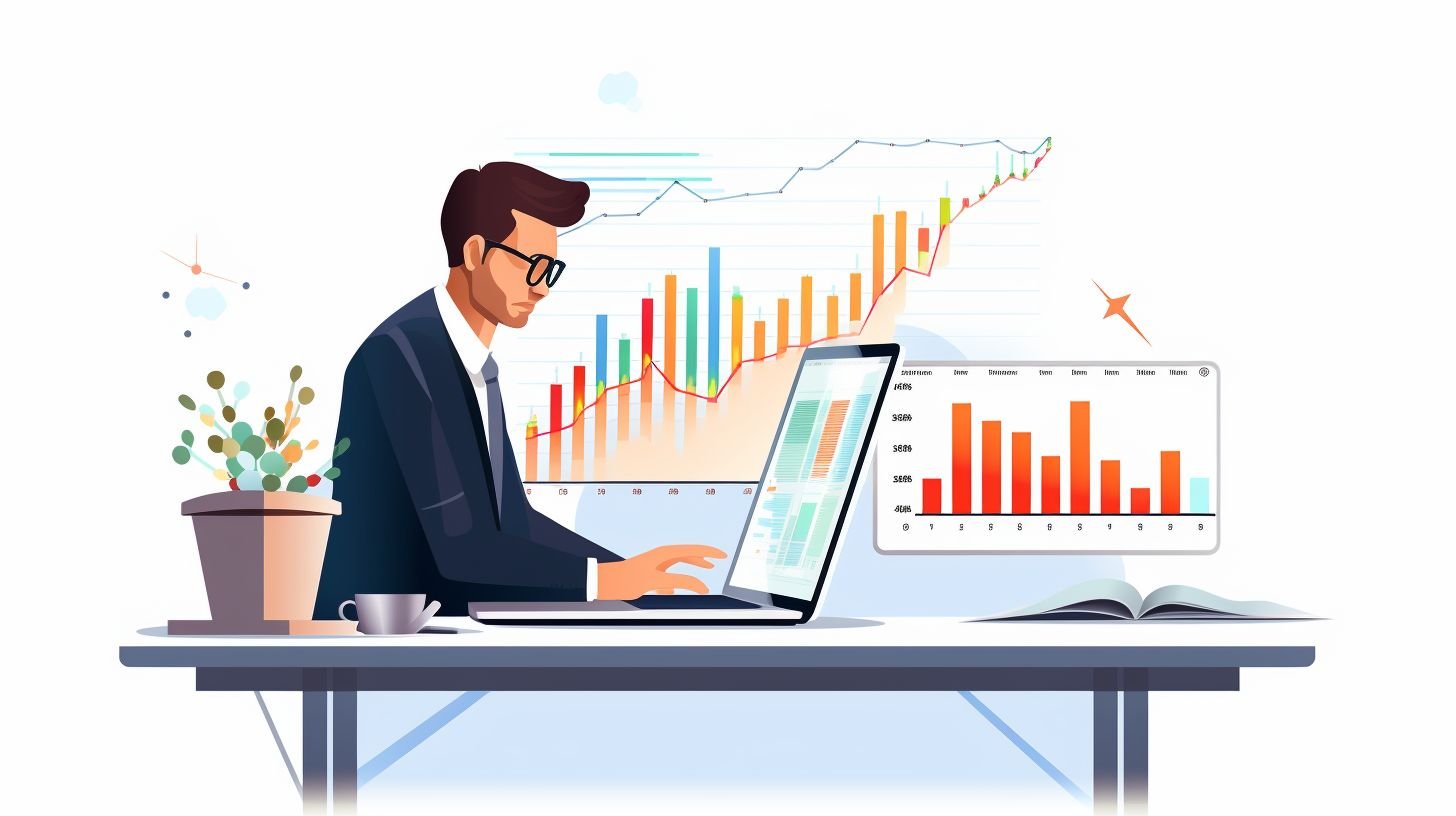Investing During Economic Downturns

Feeling a bit uncertain about investing during economic downturns and concerned about what that means for your financial future? Trust me, you’re not alone. In fact, a recent survey revealed that nearly half of its respondents anticipate the U.S plunging into recession by 2023.
Don’t fret – this article aims to guide you through strategic investments which could potentially offer high returns even in tough economic climates. Ready to bulletproof your finances against any storm? Let’s dive right in!
Key Takeaways
- Investing during economic downturns can potentially offer high returns, despite the uncertain financial climate.
- Health care and consumer staples stocks tend to perform well during recessions as people still need medical services and essential products.
- Large-cap stocks with strong balance sheets are a good investment choice during economic downturns for potential long-term growth and stability.
- Funds that track specific sectors such as health care and consumer staples can provide opportunities for growth in your investment portfolio.
- Fixed – income investments like bonds or real estate can offer stability during uncertain times while providing reliable income streams.
- It’s important to avoid investing in highly indebted companies and high – risk assets like options during recessions to minimize risks of poor performance or losses.
- Emotions play a significant role in investment decisions, so it’s crucial to keep emotions in check and maintain a level head when making investment choices during economic uncertainty.
Understanding Economic Downturns

During a recession, the economy experiences a significant decline in economic activity, including decreased consumer spending, business investment, and overall growth.
What happens during a recession?
In a recession, people spend less money. They buy only what they need most. Cash flows lower for many companies. Some firms may even shut down if they can’t pay their bills or loans.
People lose jobs as businesses cut costs. Stocks that are risky do poorly in such times because fewer people are willing to gamble with their money. Yet, not all is grim during these periods! There are some stocks that can grow in value when others fall: Discount retailers and makers of basic goods like food often do well because even in tough times, people still need to eat and buy necessary items!
Are we in a recession?
It looks like the U.S. could be heading towards a recession. Many believe this might happen in 2023. A recession means money matters are not so good for more than just a few months.
It is a time of less economic activity or, in easy words, people spending less money on things. Let’s keep our eyes open and see how things turn out!
The Importance of Investing During Recessions
Investing during recessions holds significant importance due to the potential for high returns and the ability to combat economic anxiety with strategic investments.
The potential for high returns
Investing wisely during a recession can lead to big gains. You can buy stocks and other assets at low prices. Later, when the economy improves, these investments may increase in value.
This means you could earn much more than what you spent. You just need patience and smart thinking to see high returns from your investments during tough times.
Fear fighters: combating economic anxiety with strategic investments
Investing during tough times is not easy. It can make you feel scared. But it’s part of my fight against fear in an economic downturn. I focus on strategic investments to lessen the anxiety.
One way I do this is by picking out health care and consumer staples stocks as they usually perform better in a recession.[2] Large-cap stocks that have low debt, strong balance sheets, and cash flow are also good picks [3].
To find them, using stock screeners helps me a lot [4]. Another safe choice during hard times is funds like exchange-traded funds or index funds which are less risky than individual stocks [5].
Most importantly, I diversify which means putting money into many different things. This saves me from big losses if one area does poorly[6]. Making smart moves with my money gives me peace of mind even when the economy looks bad.
Best Investments During a Recession

During a recession, investors should consider investing in health care and consumer staples stocks, as well as large-cap stocks that have proven to be resilient during economic downturns.
Additionally, funds that track specific sectors can provide opportunities for growth. Fixed-income and dividend-yielding investments such as bonds and real estate can also offer stability during uncertain times.
Finally, a high-yield savings account can serve as a safe haven for cash while still earning some interest.
Health care and consumer staples stocks
During a recession, investing in health care and consumer staples stocks can be a smart move. These sectors tend to perform better than others during economic downturns. Health care employment also remains stable during recessions, as people still need medical services regardless of the state of the economy.
Consumer staples stocks include essential items like groceries and personal products, which people continue to purchase even when times are tough. Investing in these sectors can provide stability and potential for growth in your portfolio during an economic downturn.
Healthy large-cap stocks
During a recession, it is important to consider investing in healthy large-cap stocks. These are companies with strong balance sheets, low debt levels, and positive cash flow. These types of stocks have the potential to perform well during economic downturns because they are more likely to withstand financial challenges.
By investing in large-cap stocks that meet these criteria, you can position yourself for potential long-term growth and stability in your investment portfolio.
Funds that track specific sectors
During a recession, funds that track specific sectors can be a good investment option. Sectors like health care and consumer staples tend to perform well even during economic downturns.
This is because people’s need for healthcare services and essential products remains constant, regardless of the state of the economy. These funds invest in companies within these sectors, allowing you to diversify your portfolio while potentially benefiting from their resilience during challenging times.
So, considering investing in funds that focus on specific sectors could be a smart move during an economic downturn.
Fixed-income and dividend-yielding investments
During a recession, it’s important to consider fixed-income and dividend-yielding investments. Bonds and bond funds can be a good option because they provide regular payments over time, which can help cushion against economic downturns.
These periodic payments can offer a reliable income stream during recessions. Dividend-paying stocks, mutual funds, or ETFs are also worth considering as they provide stable cash flow even when the economy is not doing well.
These types of investments can help you continue to receive income during a downturn while potentially growing your investment over time.
Real estate
Real estate can be a good investment during a recession because it tends to be more stable compared to stocks. When the economy is down, property prices may decline, giving investors an opportunity to buy at lower prices.
Rental properties can provide steady income even during a recession. However, it’s important to keep in mind that commercial properties may be more affected by a recession as businesses struggle or close down.
Real estate investment trusts (REITs) are another option for investing in real estate, as they provide potential income through dividends without directly owning properties.
High-yield savings account
During an economic downturn, one option to consider is a high-yield savings account. While it is not specifically mentioned in the article, a high-yield savings account can offer advantages such as competitive interest rates and the ability to quickly access your funds.
It can provide stability and security during uncertain times, making it a reliable choice for individuals looking to preserve their capital. Additionally, this type of account typically offers FDIC insurance up to $250,000 per depositor, giving you peace of mind knowing that your money is safe.
So if you’re looking for a low-risk investment option during an economic downturn, a high-yield savings account could be worth considering.
Investments to Avoid During Recessions

During economic downturns, it is crucial to be aware of investments that should be avoided.
Bonds
Bonds are a type of investment that can be beneficial during economic downturns. They provide a steady and reliable income stream, making them especially useful during recessions. Bonds make periodic payments over time, which can help cushion investors against market volatility.
In fact, historically, bonds have outperformed most stocks during recessions. Cash held in CDs or money market funds can also provide a cushion against market downturns. So, if you’re looking for stability and income during an economic downturn, consider investing in bonds or cash alternatives like CDs or money market funds.
Highly indebted companies
During a recession, highly indebted companies face significant challenges in making debt payments. These companies have borrowed large amounts of money and have to repay it during tough economic times when their earnings may be lower.
As a result, they are more likely to struggle with bankruptcy or a decline in their stock value. Investing in these companies during recessions comes with higher risks of poor performance and potential losses.
To minimize risk during economic downturns, it is important for investors to assess a company’s debt levels and financial health before making any investment decisions. By avoiding investments in highly indebted companies, investors can protect themselves from increased risks during recessions.
High-risk assets such as options
Options are considered high-risk assets because they involve predicting the future price movements of underlying assets, such as stocks. Making incorrect predictions in options trading can result in a complete loss of investment or the need for additional funds to cover losses.
During economic downturns, when market volatility is high and uncertainty prevails, it’s generally advisable to avoid investing in high-risk assets like options. Instead, it’s often wiser to focus on more stable investments that offer protection against market turbulence and potential financial losses.
The Role of Emotions in Investment Decisions

Emotions play a significant role in investment decisions, often leading to irrational behavior during economic downturns. Understanding how emotions can impact our choices is crucial for successful investing.
Discover the strategies to keep your emotions in check and maintain a level head during times of uncertainty. Read on to learn more about navigating the world of investments with a clear mind and make informed decisions for your financial future.
Keeping your emotions in check
During economic downturns, it’s crucial to keep your emotions in check when it comes to making investment decisions. Emotions like fear and panic can cloud our judgment and lead us into making irrational choices.
It’s important to remember that successful investors stay calm and level-headed during volatile times. By maintaining a long-term perspective, we can take advantage of discounted stock prices during bear markets and eventually reap the rewards.
So, don’t let your emotions dictate your investment strategy – stay focused on the big picture and make informed decisions based on facts rather than feelings.
The importance of maintaining a level head during economic uncertainty
During times of economic uncertainty, it is crucial to maintain a level head when making investment decisions. Emotions can often run high during these periods, and it can be tempting to make impulsive choices based on fear or anxiety.
However, it is important to remember that investing should be approached with a long-term perspective.
When faced with economic uncertainty, it is essential to stay calm and focus on the big picture. Making decisions based on short-term market fluctuations or panic can lead to poor outcomes in the long run.
By maintaining a level head and sticking to your investment plan, you are more likely to achieve your financial goals and navigate through challenging times successfully.
It’s important not to let emotions drive your investment decisions during economic downturns. Instead, focus on factors such as the fundamentals of the companies you are investing in, their balance sheets, cash flows, and debt levels.
By doing so, you can identify sound investment opportunities that have the potential for growth even during tough times.
Stocks That Often Do Well During Recessions
During economic downturns, there are certain stocks that tend to perform well. Want to know which ones? Read on to discover some recession-resistant industries and strong balance sheet companies that could be a smart investment during tough times.
Strong Balance Sheets
During a recession, companies with strong balance sheets have a better chance of weathering the storm. These are large-cap stocks that have low debt, positive cash flow, and profitability.
They are more likely to thrive because they have the financial stability to ride out economic downturns. Investing in these companies can be a smart move during tough times, as they tend to perform better than others in the market.
By focusing on companies with strong balance sheets, investors can reduce their risk and increase their chances of potential returns even during an economic recession.
Recession-Resistant Industries
During a recession, certain industries tend to perform better than others. These recession-resistant industries are known for their ability to withstand economic downturns and maintain stable performance.
One such industry is healthcare. Healthcare stocks have shown resilience during previous recessions, as people still need medical services regardless of the state of the economy. Consumer staples is another recession-resistant industry.
These companies produce essential items like groceries and personal products that people continue to buy even during tough times. Overall, investing in recession-resistant industries can be a smart strategy to protect your investments during an economic downturn.
Preparing for the Economic Recovery
As the economy begins to recover, it’s important for investors to be prepared and proactive. Learn how to position yourself for potential growth opportunities by reading more.
Is It Risky to Invest When a Recession is Nearing?
Investing when a recession is nearing may seem risky, but it can actually be an opportunity. During a recession, stock prices tend to be lower, which means you could potentially buy stocks at a discount.
History has shown that the stock market eventually recovers from downturns and goes on to reach new highs. It’s important to remember that investing during a recession should be done with a long-term perspective and careful consideration of your financial goals and risk tolerance.
By diversifying your investments and focusing on strong companies with solid balance sheets, you can mitigate some of the risks associated with investing during economic uncertainty.
Investing During the Recovery

Investing during the recovery can be a smart move. Large-cap stocks with strong balance sheets and positive cash flow tend to do well. It’s also a good idea to diversify your investments by using funds like exchange-traded funds or low-cost index funds.
These are less risky than investing in individual stocks. Companies with healthy financials, such as low debt and strong cash flow, are less vulnerable during this time. So, keep an eye out for those opportunities for potential growth in the market.
Is Social Impact Investing a Viable Option During Economic Downturns?
Social impact investing can indeed be a viable option during economic downturns. This type of investment prioritizes both financial returns and social or environmental impact. By directing capital towards projects that address pressing social issues, such as healthcare or renewable energy, social impact investing can stimulate economic growth while contributing to positive change. As businesses and governments seek sustainable solutions, social impact investing can play a crucial role in rebuilding and transforming economies during challenging times.
Conclusion
Investing during economic downturns can be a smart move for those who understand the potential benefits and risks. By strategically investing in sectors like health care and consumer staples, as well as large-cap stocks with strong balance sheets, investors can increase their chances of weathering the storm.
It’s important to keep emotions in check and maintain a level head when making investment decisions during uncertain times. Ultimately, by diversifying investments and staying informed, individuals can position themselves for long-term success even amidst economic challenges.






